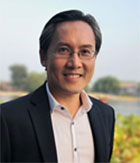SPS Webinar: 26 January 2022, by Dr. Ba-Ngu Vo - Bayesian Multi-object Tracking: Probability Hypothesis Density Filter and Beyond

Upcoming SPS Webinar!
Title: Bayesian Multi-object Tracking: Probability Hypothesis Density Filter and Beyond
Date: 26 January 2022
Time: 09:00 AM ET (New York time)
Duration: Approximately 1 Hour
Presenters: Dr. Ba-Ngu Vo
Based on the IEEE Xplore® article: The Gaussian Mixture Probability Hypothesis Density Filter
Published: IEEE Transactions on Signal Processing, October 2006
Download: Original article will be made freely available for download for 48 hours from the day of the webinar, on IEEE Xplore®

Abstract:
In his seminal paper, Dr. Ronald Mahler not only developed the Probability Hypothesis Density (PHD) filter, but also detailed the Random Finite Set (RFS) framework for multi-object systems. These complex dynamical systems, in which the number of objects and their states are unknown and vary randomly with time, have a wide range of applications from surveillance, computer vision, robotics to biomedical research. Although popular in multi-object tracking (MOT), the PHD filter is a multi-object localization filter, not a MOT filter. This talk provides an overview of the PHD filter and how the same RFS framework can be used to address multi-object trajectory estimation. By using labels to distinguish individual trajectories, this approach admits MOT filters that alleviate integration over multiple scans and enables modeling/estimation of ancestry for spawning objects. Labeled RFS posterior/filtering densities are closed under truncation and admit analytic truncation error–critical for numerical approximations. In practical terms, labeled RFS solutions are numerically efficient, alleviating the key computational bottlenecks in the number of objects/measurements, number of sensors, and number of scans.
Biography:

Dr. Ba-Ngu Vo received dual Bachelor degrees in Pure Mathematics and in Electrical Engineering with first class honors in 1994, and received the Ph.D. degree in 1997.
He is currently a Professor in the School of Electrical and Computer Engineering at Curtin University. His research interests are signal processing, systems theory, and stochastic geometry with emphasis on tracking, situational awareness, robotics, and computer vision.
Dr. Vo is a recipient of the Australian Research Council’s inaugural Future Fellowship and the 2010 Eureka Prize for Outstanding Science in support of Defense or National Security. He is an IEEE Fellow, and is best known as a pioneer in the stochastic geometric approach to multi-object system.

